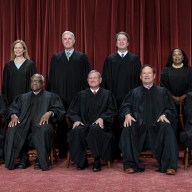EDMONTON – Casey Hudson had the weight of an entire universe on his shoulders when he started his work.
Tasked with developing the sequel to the hit role-playing video game “Mass Effect,” Hudson and his Canadian-based design team knew they faced a tall order. How to improve on the original by creating a story that is deeper and gameplay that is richer?
What’s more, how to avoid a Part 2 letdown?
The “Mass Effect” series was designed to be a trilogy. It’s easy to draw people in at first, and they live for the end – but the middle?
A legion of passionate fans awaited, demanding not to be disappointed. So the team tuned in.
“We looked at every bit of feedback we could find,” Hudson says.
Online forums, reviews – they even trolled the depths of YouTube for anyone offering an opinion on the game.
The result? Hudson says they found more than 40 areas to improve, everything from making the combat sequences more realistic to making the planets in their fictional universe more detailed.
“Every planet that you go to is going to have something different and weird and wonderful for you to discover,” Hudson says, with an enthusiasm bordering on salesmanship.
“It just feels better. It’s more fun.”
“Mass Effect 2” for Xbox 360 and PC is to hit store shelves Tuesday with all the hype of a big-screen “Star Wars” instalment.
The first “Mass Effect,” set in the year 2183, told the tale of an elite human soldier, Commander Shepard, and his travels through the universe aboard the starship Normandy defending humankind from various alien forms. The game player controlled Shepard’s decisions along the way, such as where to travel and even which sex partner to pick.
The game won critical acclaim and numerous awards, selling 1.6 million copies in the first seven weeks after it was released in 2007.
“Mass Effect 2” picks up where the first instalment left off with a mysterious new enemy: the Collectors. On the fringes of space, entire human colonies are being abducted. Shepard has to work with Cerberus, a ruthless organization devoted to human survival, to stop the threat.
It’s a suicide mission, Hudson says, although he promises that won’t hamper “Mass Effect 3.”
“As epic as people thought the first game was, ‘Mass Effect 2’ actually broadens the scope.”
The game is peppered with new elements. A new dialogue system lets players interrupt conversation, with force at times. Shepard now has 19 weapons at his disposal, and members of his squad can be controlled in real time. Voices for the characters include stars Martin Sheen, Seth Green and Tricia Helfer of Battlestar Galactica fame.
But creators are proudest of an addition they say is an industry first.
Players who painstakingly worked their way through “Mass Effect,” making countless decisions with their character, won’t have to start again in the sequel. Every decision is imported into the new game and factors into the direction of the story in “Mass Effect 2.”
“It’s not just character stats,” Hudson says. “That part has been done before. It is actually every decision that you’ve made. Hundreds of decisions – the way that you’ve progressed.”
“Mass Effect” is one of the flagship titles for BioWare. The Edmonton-based company is a Canadian business success story. It was acquired by video game giant Electronic Arts in 2008 alongside Pandemic Studios in an $860-million deal.
Asked about the company’s goals, founder Greg Zeschuk isn’t humble.
“Entertain the world,” he says.
Asked to boil that down, he says the company wants to deliver the best story-driven games.
“At some level we’ve actually been competing against ourselves for the last 15 years now. I certainly hope there are not a lot of people out there wondering if we are going to stumble, but we are really obsessed with making each game better than the last.”
“Mass Effect 2” is the first instalment in the series to be released since the EA deal, but Zeschuk says players won’t notice a difference.
The deal has brought BioWare certainty – it knows its games will be published.
“When we were independent, a large part of our time was spent looking for the next deal, because first and foremost on the minds of an independent company is: ‘How do you pay the bills?’ ” he says.
“That whole chunk of effort for us is gone and instead what we can do is we can focus on how we are marketing it, how we are promoting it – redirect those efforts back into the company.” Building a buzz like the one around “Mass Effect” requires a combination of a great game and great public relations, Zeschuk says. And BioWare and EA are pros.
The launch trailer for “Mass Effect 2” was to air during the NFL’s NFC championship game Sunday – an audience in the tens of millions. EA put out a news release on Friday just to make sure everyone knew.
The first teaser trailer released for “Mass Effect 2” seemed to foreshadow the death of Shepard with a destroyed piece of armour and blood.
It sent fans into a tizzy and they flocked to forums wondering if it could really be true.
“People put all those things together and started worrying: ‘Is Commander Shepard dead? I just finished “Mass Effect 1.” What happened to my character?’ ” Hudson says.
Not to worry, Shepard is still alive.
“I’m not entirely surprised about the buzz. It is in some ways almost refreshing,” Zeschuk says. “It’s nice to see people responding aggressively, as they have.”
How will BioWare know it accomplished its mission to keep fans happy with “Mass Effect 2?”
Better reviews, maybe more sales, Zeschuk says.
“We wanted to make combat more visceral and more exciting, and if we can actually see the benefit of that in the overall success of the product, that would be a big, big win for us.”
















